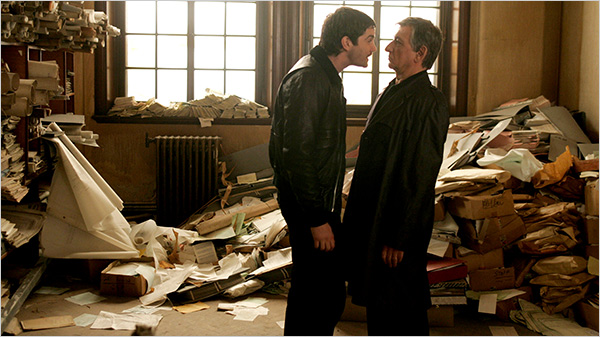|
Reviews of Recent Independent, Foreign, & Documentary Films in Theaters and DVD/Home Video

FIFTY DEAD MEN WALKING The suspenseful thriller Fifty Dead Men Walking is about trying to thwart violent people with long memories who hold grudges and wreak vengeance. But it’s not about gangsters or politics, even though it opens with a scruffy man named Martin McGartland checking under his car for a bomb. Flashback eleven years to 1988, and he’s an affable, handsome teenager (Jim Sturgess of Across the Universe and 21), who only knows of life during the Troubles in Belfast, Northern Ireland. He’s fed up with the chronic annoyances of British military occupation—security checkpoints, house searches, constant hassling from soldiers, lack of jobs. But he’s more revolted watching Irish Republic Army thugs intimidate his neighbors with kneecappings and other forms of ruthless revenge for small infractions or vague suspicions, and by the collateral damage of civilian casualties. When he’s picked up in a security sweep while hawking stolen goods, an agent of the Special Branch (the Northern Ireland security police), code named Fergus (Ben Kingsley), forces him to look at a colleague’s body in the morgue: “Your mates tortured him for 37 hours.” He then propositions Martin to be a spy. The divided loyalties and tensions of being undercover have been seen in the Hong Kong triad trilogy Infernal Affairs, the Boston-set remake The Departed, and Donnie Brasco in New York City, but those stories, fictional or not, were about cops. Martin becomes a double agent in his own home, informing on those he has known since childhood, like Sean (Kevin Zegers—filled out and with a tough accent, he’s barely recognizable from Transamerica). The code of silence surrounding Martin is apparent at a funeral for a tortured suspected informer, where the father eulogizes: “I don’t blame the IRA for killing him. I blame my son for the choice he made to go against his family and this community!” With the Special Branch financing a car for his taxi-service cover, Martin step-by-step rises up the IRA hierarchy, earning trust as he prevents—by alerting the British in advance—bombings and snipers from reaching their targets. (Sean does muse: “Seems like when you’re around nothing blows up.”) Martin is even sent on an IRA mission to peaceful Scotland to buy weapons from Libyans. Martin doesn’t bring up religion or politics, but Fergus narrates the film thoughtfully and tends to talk to Martin in aphorisms as they discuss breaking the law in the name of the law. The emotional rationale for Martin’s parallel lives is his need for a father figure, made too visually obvious in juxtapositions as he’s seen walking alternatively with a senior IRA contact and then Fergus in ominous strolls through cemeteries. He’s hiding both involvements from his feisty girlfriend (Natalie Press), who is understandably furious when he disappears from her and their children for days. Despite being filmed on the Belfast streets, the film’s lack of political context gives it less of an authentic feel than Ken Loach’s Wind That Shakes The Barley or Paul Greengrass’s Bloody Sunday. Rose McGowan, as a mysterious IRA intelligence agent, not only plays up her on-screen comparison to Mata Hari, but calls attention to the casting of outsiders, regardless how well the rest of the cast masters the Belfast accent. (It will be released with English subtitles, but they really aren’t necessary.) Writer/director Kari Skogland, whose previous feature film was the tearjerker The Stone Angel, dynamically demonstrates that Kathryn Bigelow isn’t the only woman who can make an action movie. Intimate, intense close-ups alternate with cinematographer Jonathan Freeman’s racing handheld camera work, using a very different palette than his pretty images in The Edge of Love and Hollywoodland. McGartland has disassociated from this adaptation of
his memoir (there’s a disclaimer in the credits),
but Skogland
follows his basic story, as well as incorporates some revelations from
his sequel Dead Man Running.
The political peace agreement in the 1990s was irrelevant to the betrayals against
him that were even worse than portrayed. Regardless of any political
interpretations, the title refers to those whose lives the British
credit him with saving. Fergus goes further: “Dead men will be fathers
and become grandfathers because of you.”
Nora Lee Mandel
|

